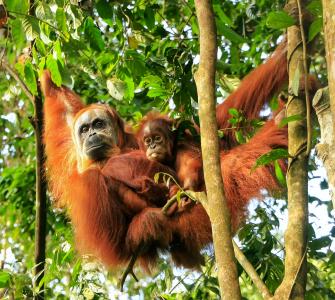Located on the island of Sumatra, Aceh is the westernmost province in Indonesia. Supporting some of the most wide-ranging biodiversity in the Asia Pacific region, the province’s unique ecosystems are home to numerous iconic species, including the Sumatran rhinoceros, tiger, orangutan and elephant. However, Aceh province is perhaps better known for its unique regional history.
As the closest point of land to the epicenter of the 2004 earthquake and tsunami, Aceh was directly impacted by both of these natural disasters. As a result, the province suffered irreparable damage not just to its communities and infrastructure, but also to its landscapes and native species. In addition, Aceh’s significant oil, natural gas, and other natural resources have created challenges recently in land and resource management due to both domestic and international pressures. What’s more, the province was embroiled in a tumultuous independence movement for roughly 30 years, which finally ended with the signing of a 2005 peace agreement. With this in mind, there is an unprecedented opportunity to promote new and strategic, long-term development plans that balance future economic development with environmental protections.
To this end, Wildlife Conservation Society (WCS) has been working in Aceh province’s Leuser landscape to develop a low carbon trajectory that supports Aceh’s designation as an intact forest province. CSF supported WCS by conducting a study to assess the opportunities for future sustainable development in Aceh and the potential strategic role of WCS. Specifically, the study had several objectives: (a) assess the current development situation and trends in Aceh Province by collecting information on the socio-economic, demographic, and political situations related to forest, land-use, and marine resources; (b) collect information on past and current sustainable development initiatives implemented by the Aceh Government and partnering institutions/organisations; (c) provide appropriate development pathways for implementing a sustainable economic development approach; and (d) produce options and recommendations for WCS to help the government of Aceh manage and conserve its natural resources.
This study was a desk-based review of relevant reports, spatial data sets, and a compilation of key macroeconomic indicators and their trends. The study team conducted a field visit to meet with key stakeholders and officials representing government, academia, civil society, and other community leaders in Banda Aceh, Aceh Jaya district, and Aceh Selatan district. The results will be used to influence future activities undertaken by WCS in Aceh to protect this region’s unique natural wealth.
Photo: Sumatran orangutans, Mount Leuser National Park, Indonesia
Photo Credit: Don Mammoser/ Shutterstock.com

